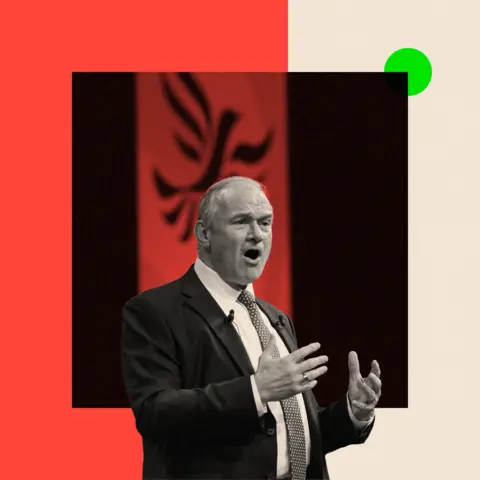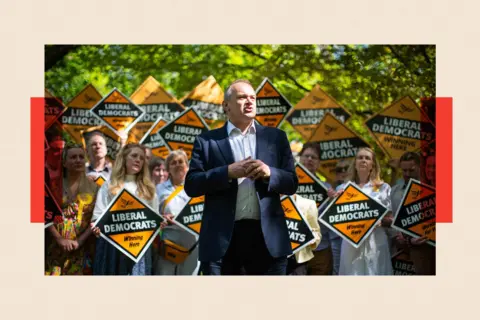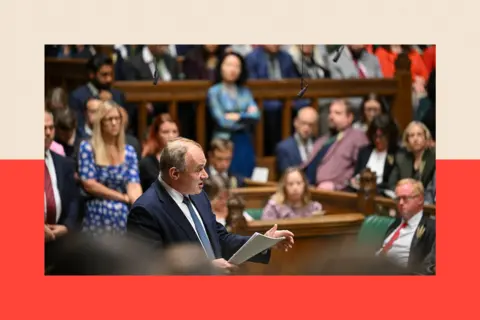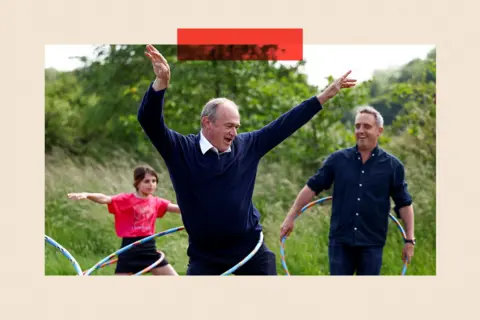Ed Davey loves clowning around, but is it time the Lib Dems got serious?
5 hours ago
 Laura KuenssbergPresenter, Sunday with Laura Kuenssberg
Laura KuenssbergPresenter, Sunday with Laura Kuenssberg

 BBC
BBCBeing ignored is a nightmare for any politician.
You don’t win votes if no-one knows who you are. You don’t get a tick in the box if the name on the ballot paper means nothing to the voter clutching their stubby pencil in the voting booth.
In the last couple of years the Liberal Democrat leader, Sir Ed Davey, has bungee-jumped, jet-skied, and even ridden a hobby horse into the public’s imagination in a way that helped his party to success in the general election, surpassing their own hopes.
He proved there is wisdom in playing the clown in politics – if it gets you attention. But too much clowning around might not look so smart.
And while the government is unpopular, and the Conservatives seem miles from any kind of recovery, the Lib Dems have not been the main beneficiaries from their mutual misery.
As the Lib Dems gather in Bournemouth this weekend for their annual get together, there will be a certain amount of understandable jollity.
That’s not just because of the Lib Dems’ traditional glee club, or the fact that political activists enjoy their conferences the way that many of us might enjoy a minibreak with mates. It’s a different kind, with warm, not cold, wine, and earnest discussions in stifling rooms, rather than a walk on the beach or a lie-in, although the budget hotels and deep fear of rail replacement services to get there are the same.
But the Lib Dems are broadly in a good place after the general election, and they had more gains in council elections in May. They have dozens of new MPs, and a rebooted team on their front bench.
The question hanging over their conference in Bournemouth this weekend is expressed by one of their MPs: “Where do we go now, to make sure it’s not a false start?”
In other words – what next, where, and how? No doubt, there is opportunity for the Lib Dems.

 Christopher Furlong/Getty Images
Christopher Furlong/Getty ImagesIn the words of one party insider: “What are a lot of Labour people talking about? Plotting against the leader. What are a lot of Tory people talking about? Plotting against the leader.”
The two big parties are both partly distracted by their own woes, which could provide the Lib Dems plenty of political space.
Look at the numbers and the map. In the general election the Lib Dems swept up 60 seats from the Conservatives – nearly all in the South.
The party relentlessly focused on places where they had a decent shot at winning, rather than run vigorous campaigns in every corner of the country. They were, as a result, only in second place in 27 seats.
They were also predominantly in the south of England, and 20 were won by the Conservatives.
So if you follow the logic, the obvious next tranche of seats and voters for the Lib Dems to target are Tory-held parts of the country, and Tory-leaning voters.
“Look at what’s happening on the right, there’s a ferocious split, and the Tories are crumbling,” says one party figure excitedly.
Another says: “There is a continuing opportunity to drive down those centrist remainer Conservatives who are still left in that camp – where we were in second place, that is a serious opportunity.”
But the party is already looking at other seats where they were in third place last time round.
One MP tells me: ”The conventional wisdom would be where we were second to the Tories, the natural ambition would be to take on all of those seats.
“But the interesting things come about in other parts of the country, we might be in third or fourth place but an insurgent Reform UK could completely change the race – the numbers and where we might have ambition might be very different.”
But how do you make the most of that chance?

 James Manning/PA Wire
James Manning/PA WirePolling by research group More in Common suggests the party should perhaps lay off the stunts.
Data shared with me suggests most voters, even those who back the party, have had enough of the water slides and wet suits.
Fresh polling, being published this weekend suggests three in five Britons (61%), think Sir Ed’s campaign antics make the party look less serious, compared to 21% who believe they are a good way to grab attention.
Even nearly half of Lib Dem backers, 47%, reckon the stunts aren’t appropriate and make the party look less serious.
And when it comes to what the party is all about, many voters aren’t really that sure.
When the pollsters asked people to express their opinion of the Lib Dems and the leader, the top phrase this time round was “don’t know”, even though “good” and “nice” were also common descriptions.
Yet there seems zero chance Sir Ed is going to retire what one of his allies openly describes as his “embarrassing dad” stunts.
Without question, that tactic grabbed attention in the general and council elections: “He does these photo opportunities where he comes across as a slightly embarrassing dad, but he can do serious speeches about foreign affairs and care and hold his own – we are going to keep doing all of those things.”
The party is proud of what he and it has achieved in the last couple of years.
But it also has to do with what the Lib Dems have always done, which is dig in to the communities where they have won votes and seats.

 House of Commons/PA Wire
House of Commons/PA Wire“Our first priority is that our 72 MPs become like Japanese knotweed, you can’t unroot them – why would you not do that? If all the MPs scurried off and immediately do stuff in Westminster and weren’t paying attention to the church roofs, then that wouldn’t work,” says one MP.
But insiders acknowledge the party will have to expand its range of ideas and “the offer” to use the nauseating political jargon, beyond Sir Ed’s campaigning on care for the vulnerable and those stunts.
He has effectively and movingly talked extensively about his own family’s experience to keep pushing the issue.
So as conference opens, Sir Ed will outline ideas on immigration, calling on the Conservatives to apologise for the mess they left and on the government to open temporary “nightingale” courts to speed through the backlog of cases that has let thousands stuck in hotels round the country – miserable for them, and miserable for many in the communities where the hotels are located.
We’ll talk to him about that and plenty more on the show on Sunday.
The party already regularly presses the government for a closer economic relationship with Europe. But several MPs predict the next election will still be “about the economy stupid”, and it’s not clear yet what the party’s clever answer will be to that classic question.
But in the clamour of politics in 2025 the Lib Dems have another quandary. “How do you excite people about moderate positions?” asks one senior source.
There is a common complaint that the party’s ideas don’t get the attention they ought to, particularly given that Reform UK have sucked up so much political oxygen in the last few months.
The news is not dictated by straightforward formulae, it’s driven by events and sentiment.
The Lib Dems do have massively more MPs than Reform. But Reform got four million votes, more than the Libs Dems at the last election, and have been leading the national polls for many months.

 Jeff J Mitchell/Getty Images
Jeff J Mitchell/Getty ImagesOne MP admits: “There was probably an assumption that party numbers would naturally translate into more media coverage. We will argue the media are not giving us the coverage we deserve, but we also need to consider how we can use 72 MPs across all channels to get our message across more effectively.”
You can see that the Lib Dems are starting to play more into the arguments that Reform has been shaping, although arguably, a politics more based on identity that had arrived long before their uptick in the polls – a politics more based on noise and emotion, values and vibes not traditional Whitehall fare.
The party’s new focus according to one frontbencher is “to reclaim the space of being positive and patriotic and standing for British values”.
That’s why in recent times the party has been critical of US tech firms.
Sir Ed boycotted the state banquet this week, and party HQ has a obvious habit of firing out press releases that contain the words “Trump”, “Musk”, or branding Farage a “plastic patriot”. There’ll be another example of this strategy in Davey’s speech on Tuesday when he’ll call on the regulators to go after Elon Musk.
Clearly, the Lib Dems believe it is a noble aim to “call it out” to confront populism and, for example, to condemn Musk’s controversial remarks to the Tommy Robinson Unite the Kingdom rally in London last week.
But, of course, they are also trying to seek political advantage.
One source says the party is trying to make the most of “voters who are unconvinced by Badenoch, but horrified by Farage”.
Another says it’s an attempt to appeal to voters who are “shocked by the extremes”.
It is hard to, as that other insider said: “Excite people about moderate positions.”
But the party hopes there is mileage in colourful criticism of the wilder side of politics in 2025.
Sir Ed’s speech this week is expected to define what being British means to him and his party, stepping more firmly on to political terrain of values and vibes – a fashionable place for politicians to be right now.
Without doubt, he’ll walk on to the conference stage in Bournemouth in a strong position, with a largely happy party behind him.
But in time the Lib Dems will need to think through how to sell a set of moderate ideas to a voting public that appears to be eager for more drastic solutions.
And add more substance to the stunts, to capture more people’s long term interest, not just the lens of waiting photographers and TV crews.


Sign up for the Off Air with Laura K newsletter to get Laura Kuenssberg’s expert insight and insider stories every week, emailed directly to you.


More from InDepth
BBC InDepth is the home on the website and app for the best analysis, with fresh perspectives that challenge assumptions and deep reporting on the biggest issues of the day. And we showcase thought-provoking content from across BBC Sounds and iPlayer too. You can send us your feedback on the InDepth section by clicking on the button below.